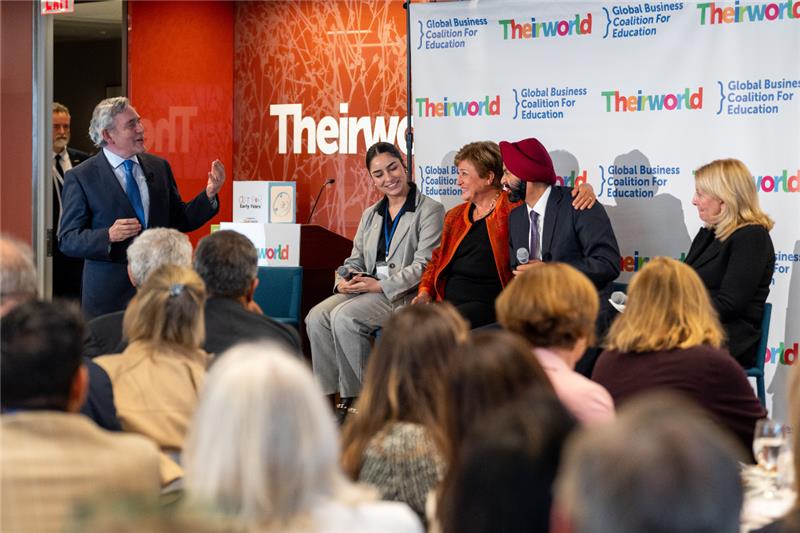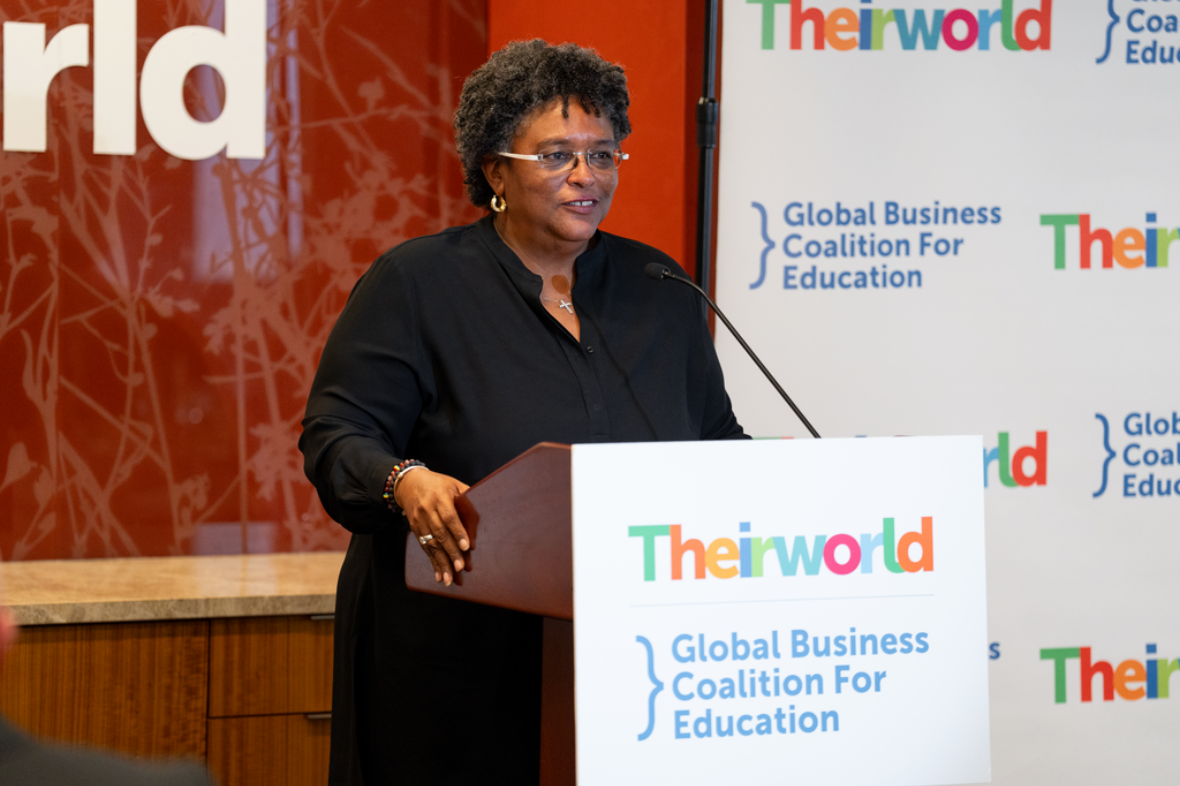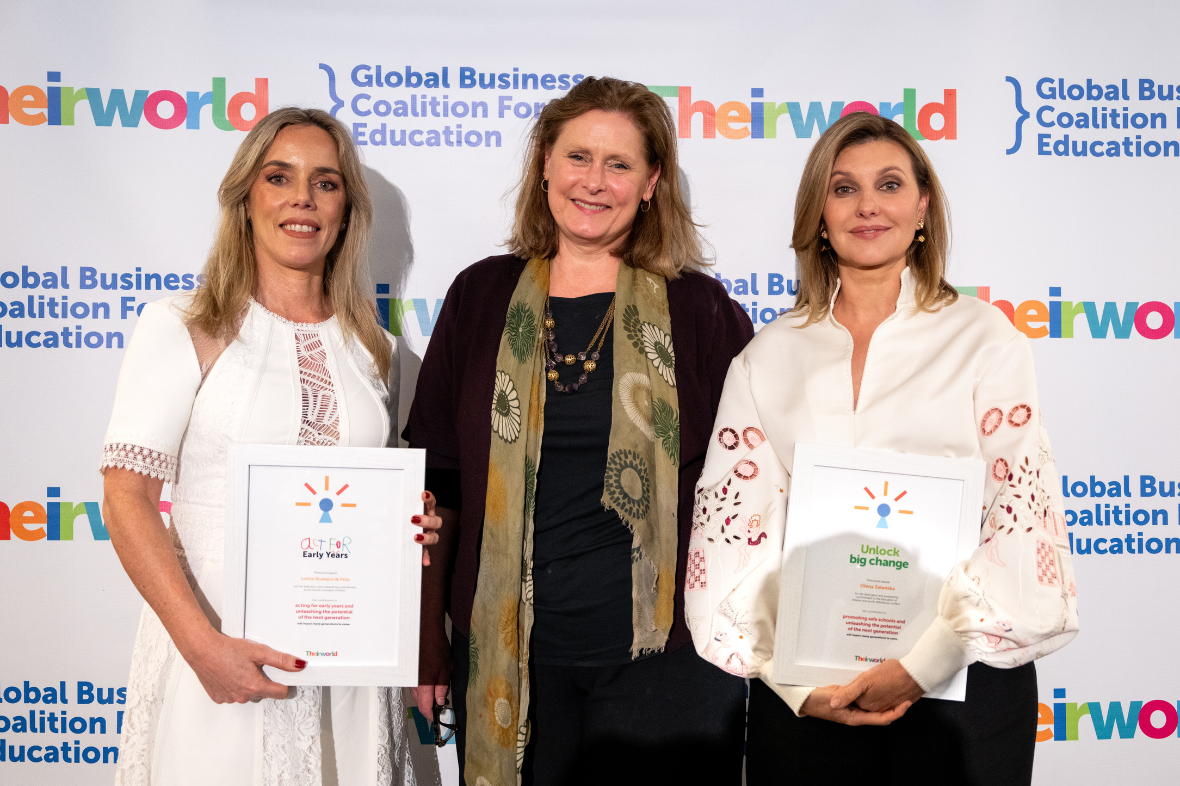Leaders agree education is crucial to unlocking global goals

A high-level event spotlighted how education can be crucial in tackling issues such as climate, conflict and unemployment.
Heads of government, philanthropy, business and other institutions came together today to place education at the centre of efforts to tackle climate change, conflict and unemployment.
The high-level Educating for the Next Generation event in New York was held as world leaders had been gathering at the United Nations’ Summit of the Future to forge a new consensus to tackle the pressing challenges of today and tomorrow.
Also attending today’s education event were representatives of UN agencies, youth movements, civil society and academia. Against a backdrop of division and polarisation in the world, they agreed on the need to invest in young people and prioritise education, with everyone working together to create a safer, more prosperous future.
Educating for the Next Generation examined how Sustainable Development Goal 4 on inclusive and equitable quality education for all can unlock progress on other global goals.
It was co-hosted by Her Excellency Mia Mottley, Prime Minister of Barbados; Gordon Brown, UN Special Envoy for Global Education, World Health Organization Ambassador for Global Health Financing and former Prime Minister of the United Kingdom; and Sarah Brown, Chair of Theirworld and Executive Chair of the Global Business Coalition for Education.
It was also attended by the presidents, prime ministers, first ladies and government ministers from many countries. National leaders included Mohammed Irfaan Ali, President of Guyana; Julius Maada Bio, President of Sierra Leone; Dr Ralph Gonsalves, Prime Minister of Saint Vincent and the Grenadines; Faure Gnassingbé, President of Togo; Simon Harris, Taoiseach of Ireland; Fiamē Naomi Mataafa, Prime Minister of Samoa; Dr Luc Mercelina, Prime Minister of Sint Maarten; Dickon Mitchell, Prime Minister of Grenada; Robinah Nabbanja, Prime Minister of Uganda; Santiago Peña, President of Paraguay; Feleti Penitala Teo, Prime Minister of Tuvalu.
Other high-level attendees included Fatima Maada Bio, First Lady of Sierra Leone; Ann Marie Davis, First Lady of the Bahamas; Maricel de Mulino, First Lady of Panama; Leticia Ocampos, First Lady of Paraguay; Lucrecia Peinado, First Lady of Guatemala; Olena Zelenska, First Lady of Ukraine; Abbas Al Halabi, Minister for Education, Lebanon; Awut Deng Acuil, Minister of Education, South Sudan; Anneliese Dodds, Minister for Development, United Kingdom; Christopher Maclennan, Deputy Minister of International Development, Canada; Walter Gutiérrez, Minister for Childhood, Paraguay; Michaél Martin, Tánaiste of Ireland; Roberta Metsola, President of the European Parliament; Robert Persaud, Foreign Secretary, Guyana.
In his opening remarks, Theirworld President Justin van Fleet spoke about the importance of education in the climate context – to protect against its impact and as a way of restoring normality for children and youth in the wake of disasters.
Mia Mottley also focused on climate change and its effect on island nations in particular, saying that it is seriously impacting children’s education and futures.
She added: “All of us know why we are here and why we need education reform. Why investment in education is utterly crucial. But we are distracted by war, the climate crisis and geopolitics.
“For every year that children lose the capacity to come into mainstream learning, it becomes more difficult. The rate at which the climate crisis is coming upon us means we have a decade to minimise losses in our country.
“Children, more than anything else, deserve the best opportunity that they can have to learn and be given a chance for a better future. The bottom line is that we can make the kind of decisions based on consensus that what the world needs now is a deal for children that is fair and honest.”
She said there is a need for a mechanism to provide long-term investment, together with education reform, to achieve this.

Mia Mottley, Prime Minister of Barbados, addresses the education event (Theirworld/Ilya Savenok)
The event featured a panel discussion moderated by Gordon Brown, who said achieving the Sustainable Development Goals can deliver a better, stronger, more resilient planet for an educated younger generation to take forward.
He said: “Given the education crisis that we have – 260 million not in school – we must give children hope. We can bring hope alive by coming together and making sure that we develop all of the potential of all of the children.”
The panel comprised Ajay Banga, President of the World Bank Group; Kristalina Georgieva, Managing Director of the International Monetary Fund; Catherine Russell, Executive Director of UNICEF; and Andressa Reis, a 21-year-old Theirworld Global Youth Ambassador from Brazil.
Ajay Banga was asked how innovative financing can help to tackle the education crisis. He said: “1.2 billion young people in the emerging markets will become eligible for jobs in the coming years. In the same countries in the same time period, the likely jobs that will be created is 400 million.
“You can change this – but you have to do something. How do you change their lives? You involve them from day one – malnutrition and stunting are real problems. The World Bank is helping mothers in many countries with this.
“If they get past this phase, there is the issue of preschool and primary education. We have programmes helping hundreds of millions of children but it’s insufficient. Then there is the problem of matching skills to the jobs that are coming.”
He talked about the role of the International Development Association, the part of the World Bank that helps the world’s low-income countries, being the single best solution to these challenges.
Kristalina Georgieva addressed the role of technology and artificial intelligence in the education and labour skills market.
She said: “The public wants kids educated but the public does not want to pay taxes. They do not want to give money. My job is to help member countries square this circle, how to prioritise spending and to see education not as cost but as investment in the future.
“We are increasing our lending capacity for low-income countries and giving longer-term money to tackle climate. And we create public acceptance for increasing and collecting taxes.
“It takes unity of purpose by all of us to bring hope and action.”

Theirworld Chair Sarah Brown (centre) with award winners Leticia Ocampo and Olena Zelenska (Theirworld/Ilya Savenok)
Catherine Russell also spoke about the need to focus on early years. UNICEF is part of the Act For Early Years campaign, which was launched by Theirworld last year and has grown into a global movement. The campaign is calling for leaders to commit to at last $1 billion in new funding for the youngest children.
She said: “The challenges are so immense. But we do know mostly what we need to do. We need to make sure we help children from the start. If you make investments in preschool, it makes all the difference.
“We need to make sure they stay in education, especially girls, and we need to make sure that get the skills needed for jobs. We look at it from start to finish.”
Global Youth Ambassador Andressa Reis has experienced the impact of climate change. She was displaced by floods as a young child in Brazil, which disrupted her education. She talked about that experience and the role of education for young people today.
She said: “The youth hold the power to lead us to a more just future. We must ensure all children have access to education, to empower them not just to get jobs but also to become leaders.
“The Act For Early Years campaign draws attention to the challenges children face. If we give them resources and opportunities, they will thrive, they will lead the change and develop the future.
Theirworld Chair Sarah Brown announced two Theirworld awards, saying: “Each year we pay tribute to remarkable people who are making a difference.”
Sarah presented an Act For Early Years award to Leticia Ocampos, First Lady of Paraguay for her “dedication and unwavering commitment to the world’s youngest children”. The citation said: “Her contribution to acting for early years and unleashing the potential of the next generation will impact many generations to come.”
Sarah then presented an Unlock Big Change award to Olena Zelenska, First Lady of Ukraine. The award was given for “her dedication and unwavering commitment to the education of children and youth affected by conflict” – promoting safe schools to ensure children continue to learn despite the war.
Other attendees at the event included leaders from HP, Conrad. N. Hilton Foundation, LEGO Foundation, UNHCR, World Trade Organization, Prudential, Rockefeller Foundation and Carnegie Foundation of New York, and Lauren Powell Jobs, founder of the Emerson Collective